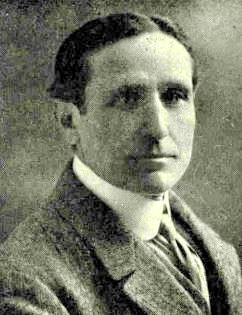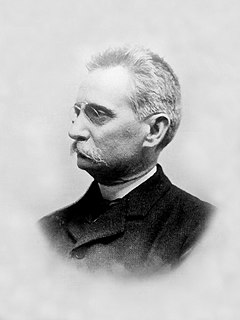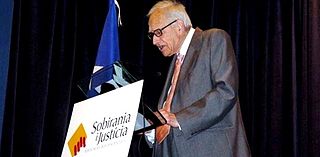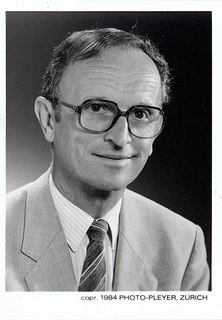
The Institute for Catalan Studies, also known by the acronym IEC, is an academic institution which seeks to undertake research and study into "all elements of Catalan culture". It is based in Barcelona, Spain.

The Autonomous University of Barcelona, is a public university mostly located in Cerdanyola del Vallès, near the city of Barcelona in Catalonia, Spain.

Pompeu Fabra i Poch was a Catalan engineer and grammarian. He was the main author of the normative reform of contemporary Catalan language.

Pere Bosch-Gimpera was a Spanish-born Mexican archaeologist and anthropologist.

Josep Puig i Cadafalch was a Spanish Modernista architect who designed many significant buildings in Barcelona, and a politician who had a significant role in the development of Catalan institutions. He was the architect of the Casa Martí, which became a place of ideas, projects and social gatherings for such well-known Catalans as Santiago Rusiñol and Ramon Casas.

Lluís Domènech i Montaner was a Spanish architect who was highly influential on Modernisme català, the Catalan Art Nouveau/Jugendstil movement. He was also a Catalan politician.

Enric Valor i Vives was a valencian narrator and grammarian who made one of the most important contributions to the re-collection and recovery of Valencian lexicography and its standardization in the Valencian Country, Spain.

José Quer y Martínez (1695–1764), was a Spanish doctor and botanist. This botanist is denoted by the author abbreviation Quer when citing a botanical name.

Antoni Maria Badia i Margarit was a Catalan linguist and philologist who produced works on the grammar and history of the Catalan language. He was born in Barcelona.

Josep Penuelas or Josep Peñuelas i Reixach is a research professor of the Spanish National Research Council (CSIC). Director of the CREAF-CSIC-UAB Global Ecology Unit located at CREAF -Universitat Autònoma de Barcelona. He is an ecologist working on global ecology, plant ecophysiology, chemical ecology, remote sensing, geosciences and atmosphere-biosphere interactions.
Werner Walter Hugo Paul Rothmaler was a German botanist and from 1953 until 1962 head of the Institute for Agricultural Biology of the University of Greifswald. His areas of expertise included plant geography and systematics.
Oriol de Bolòs i Capdevila was a Spanish botanist, pteridologist, and phytosociologist. He was a specialist in the flora of Catalonia and Spain, and also of the Mediterranean regions, the North Atlantic islands of (Macaronesia) and also Brazil.

Joan Triadu was a Catalan literary critic, academic and writer. A cultural and resistant anti-Francoist activist, he participated in many significant Catalan cultural projects of the 20th century such as the Serra d'Or magazine, the magazine Ariel, the newspaper Today or Òmnium Cultural. He was the pioneer in the post-war teaching of Catalan courses. He was the general director of the Cultural Institution of the CIC, an entity that created the Escola Thau Barcelona in 1963 and the Escola Thau Sant Cugat in 1996.
Maria Àngels Cardona i Florit was a biologist, ecologist and botanist from Menorca, who worked mainly in Barcelona.
Josep Esteve i Seguí was a Catalan pharmacist and folklorist.

Francoism in Catalonia was established within Francoist Spain between 1939 and 1975, following the Spanish Civil War and post-war Francoist repression. Francisco Franco's regime replaced Revolutionary Catalonia after the Catalonia Offensive at the end of the war. The dictatorship in Catalonia complemented the suppression of democratic freedoms with the repression of Catalan culture. Its totalitarian character and its unifying objectives meant the imposition of a single culture and a single language, Castillian. The regime was specifically anti-Catalan, but this did not stop the development of a Catalan Francoism that was forged during the war and fed by victory.
Montserrat Garriga Cabrero (1865-1956) was a Cuban-Spanish botanist.

Elisenda Paluzie i Hernández is a Catalan economist, politician, and professor from Spain. Since 24 March 2018 she is president of the Assemblea Nacional Catalana, a Catalan independence organization. She has served as Professor of Economics at the University of Barcelona since 2001, is the director of the Centro de Análisis Económico y de las Políticas Sociales there, which is integrated into the Research Institute of the Barcelona Economic Analysis Team.

Elias Landolt (1926–2013) was a Swiss geobotanist, known for his publications on Switzerland's native flora and Lemnoideae.

Joan Perucho Gutiérrez was a Spanish novelist, poet and art critic, an activity that alternated with his profession as a judge. His work, written in Catalan and Spanish mix with other traditional elements of avant-garde and science fiction that endow great originality. Natural Stories is his best known work.















